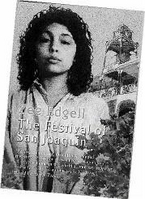
Title: The Festival of San Joaquin
Author: Zee Edgell
Publisher: Heinemann 1997; Macmillan 2008
Belizean author Zee Edgell deepens our scanty knowledge of this former British colony and now CARICOM partner and interestingly, she does so from a perspective that takes us back in time and transports us into a culture that is for a Jamaican audience 'strange', even though some could argue for redeeming merit, intriguing.
Edgell's plot for this novel is about a young and beautiful Belizean mestizo who has been jailed for killing in a fit of threatening self-defence her violent husband. The book begins with her release from prison and unfolds in her quest to return to her community and find for herself acceptance again. Of course, acceptance does not come readily, especially from among close and influential family members and foes.
As the story unfolds she relates how her historically strong Catholic community is being 'invaded' by evangelicals and so the encounter helps to give a glimpse, even if fleeting, of that resultant tension, although not violent, that characterises the Christian religion in Belize.
selfish manipulation
In process too, she gives at least glimpses of how large landowners exploit the former colony and manipulate selfishly a social system where most rural inhabitants are steeped in religious traditions that make music, singing, dancing, tobacco and sexual promiscuity everyday features of life.
Annually, for a week of celebration, a large church festival pulls all such features together under a religious cloak known as The Festival of San Joaquin. It is a strange mix of the best and worst of life among the peasants. Here is how Edgell describes it:
"For many people The Festival of San Joaquin is a prayerful week of solemn processions, church services and candles and incense. For others, it is a time of unrestrained feasting, dancing, singing, drinking, and fireworks. But sometimes the Festival can turn unexpectedly, into a time of despair, sorrow and danger" (p. 20).
That kind of unexpected turn she identifies erupts in her story. It is that tragedy that dominates the novel and runs like a thread through the plot, involving people of all kinds and interests whose contributions enrich the story.
Originally a journalist, Edgell made a name for herself when she published Beka Lamb and it won the Fawcett Society Book Prize. That book made her the first Belizean to get international attention as a novelist. She followed with In Times Like These, and Time and the River. This work, then, is her fourth novel, but perhaps not her best despite her extensive and yet growing experience in life and with fiction writing.
The profile of her on the back cover further informs that Edgell, apart from journalistic work and novel writing became Director of the Department of Women's Affairs of Belize and Head of the Women's Bureau of Belize. Internationally, she was too, Secretary to the Governing Board for Concerned Women for Family Planning in Dacca, Bangladesh, and UNICEF Consultant to the Somali Women's Democratic organization in Mogadishu, Somali. Currently, she teaches Creative Writing at Kent State University, Ohio, USA.
Yet, she has certainly not forgotten her cultural roots and this novel makes that plain. For example, she impresses with her knowledge of the flora and the fauna. Her numerous references are precise, making mention of frangipani and casurina trees, cohune palms, xova bushes, alamanda vines and habanera peppers.
That precision extends to others things, as she speaks of guyabreras, milpas, galleria ciricote doors, bobbinet veil and filigree earrings. However, there seems at least one instance when her word precision seems to have become more imagination than reality when she used without quotes the word 'fantastical' (p. 175) which seems to be neither Spanish nor English.
crossing the border
But any crossing of the line between English and Spanish may be excused in a land so fast-becoming enveloped by Spanish, as refugees from war in neighbouring Guatemala continue to cross over the border in high numbers.
On the critical side, it is unusual that her novel makes no use of an introduction, or foreword, or preface, or even a page of contents. It plunges bald, without prefatory comments, into the task, with a heading that says 'Part I'; not even Chapter I.
Throughout the novel, no character speaks to give understanding to contextual reality. Therefore, first-time readers of a Belizean novel who might have wished to learn a bit more about the country, even indirectly, will not be informed through this otherwise sociologically informative novel that Belize, formerly British Honduras (1985), is the only English-speaking country of Central America and the only one without a Pacific coastline.
Further, Belize possesses one of the greatest Barrier Reefs in the world, second only to Australia's and within its borders are to be found the greatest diversity of wildlife anywhere in the world. Nearly 30 per cent of the country is dedicated to wildlife reserves.
less in population
Comparatively, Belize is twice the land size of Jamaica but the population of 300,000 makes it less in population than the city of Portmore in Jamaica. Further, in Belize, Catholicism is dominant, holding the allegiance of approximately 50 per cent of the people (declining), and so twice that of Protestantism in Belize. In contrast, in Jamaica, the Protestant stronghold of the entire Caribbean and Latin America as well as South America, Protestants are dominant (62 per cent) and Catholics under three per cent.
This book is well worth reading for an audience au fait with Belizean life and culture and particularly those readers who will appreciate flashes of rich descriptive writing.